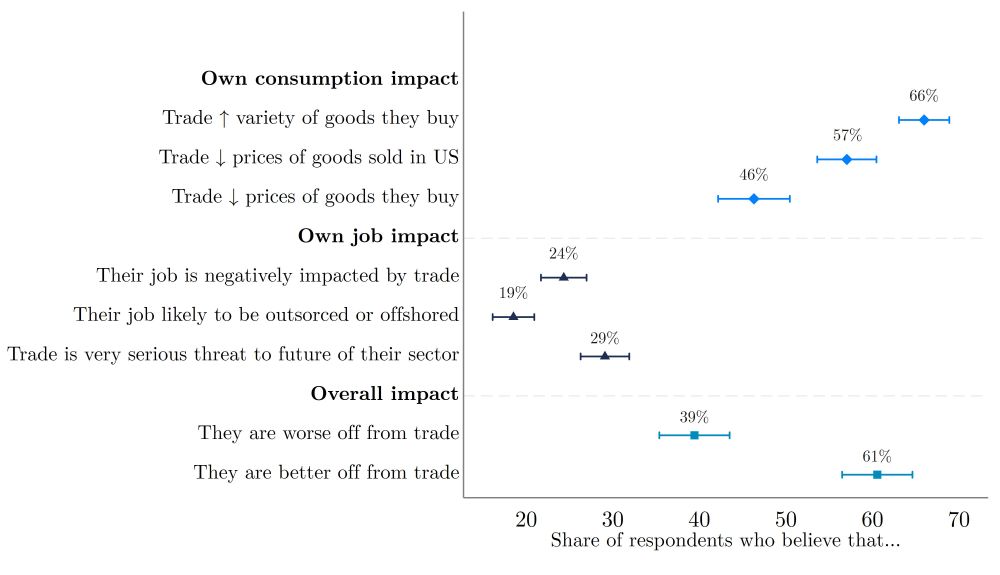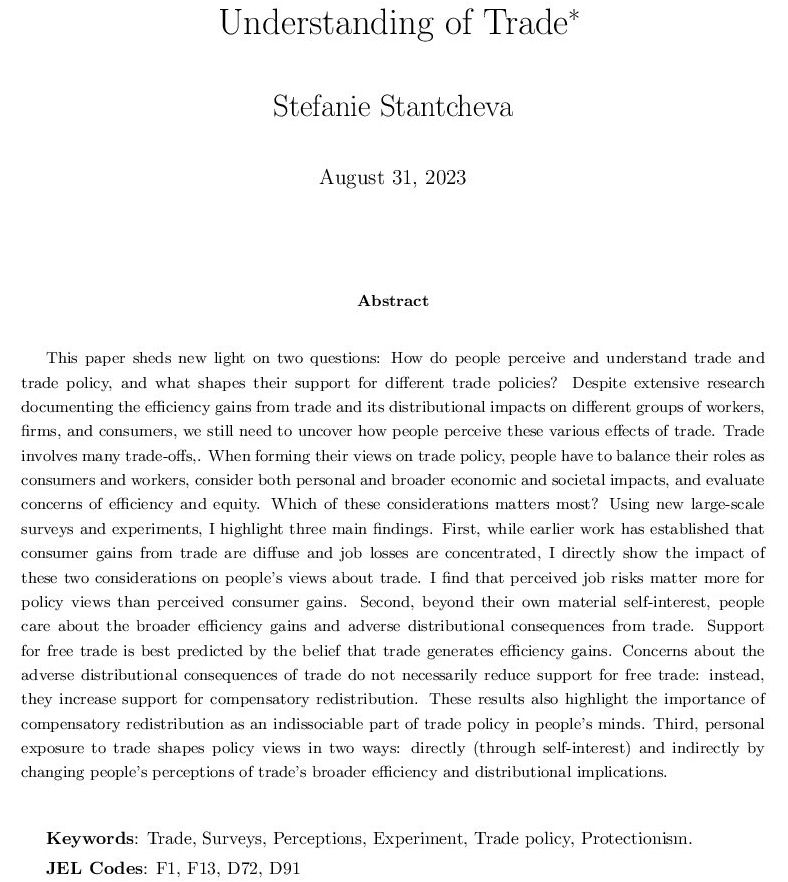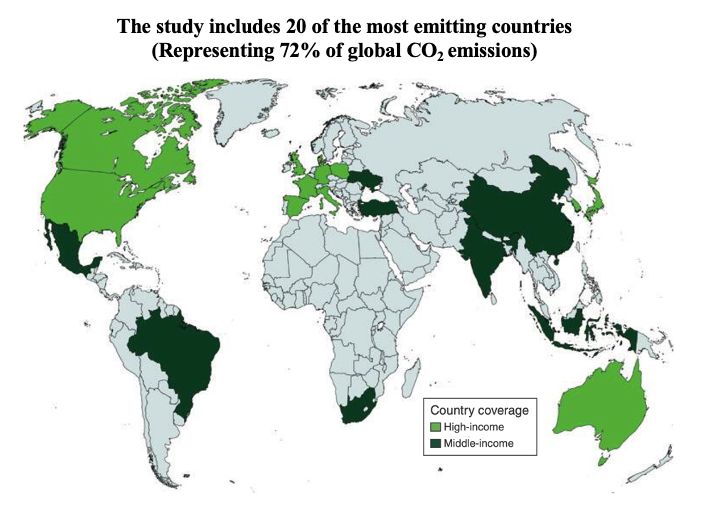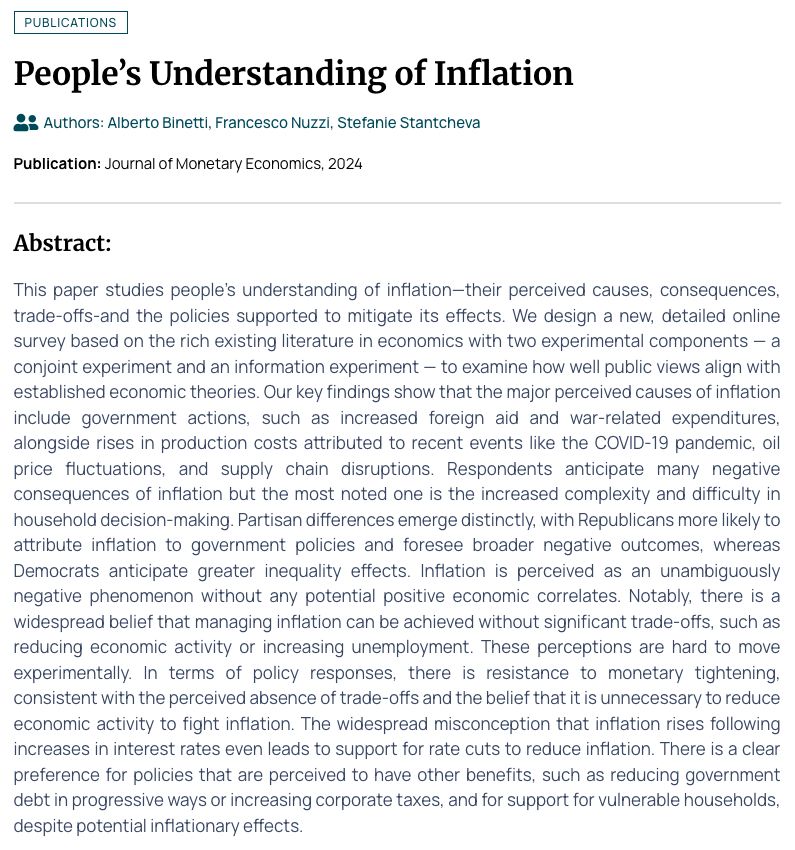Stefanie Stantcheva
@s-stantcheva.bsky.social
Super honored to be included in @projectsyndicate.bsky.social Forward Thinkers list, launched to mark their 30th anniversary and highlight 30 global voices shaping the future of public debate. Explore the full list and learn more about their work here: forwardthinkers1.project-syndicate.org. #PS30

April 17, 2025 at 1:57 PM
Super honored to be included in @projectsyndicate.bsky.social Forward Thinkers list, launched to mark their 30th anniversary and highlight 30 global voices shaping the future of public debate. Explore the full list and learn more about their work here: forwardthinkers1.project-syndicate.org. #PS30
17/19: Those who feel worse off due to trade, or are objectively more exposed to trade, are less likely to believe in the positive impacts of trade, like decreased prices, innovation, growth, or neutral distributional impacts.

April 4, 2025 at 3:19 PM
17/19: Those who feel worse off due to trade, or are objectively more exposed to trade, are less likely to believe in the positive impacts of trade, like decreased prices, innovation, growth, or neutral distributional impacts.
16/19: Third, respondents' personal exposure to trade, both subjective and objective, influences their support for trade restrictions. This exposure shapes their assessments of how trade affects them and their perceptions of trade's broader impacts.

April 4, 2025 at 3:19 PM
16/19: Third, respondents' personal exposure to trade, both subjective and objective, influences their support for trade restrictions. This exposure shapes their assessments of how trade affects them and their perceptions of trade's broader impacts.
12/19: But people are equally aware of trade's potential to exacerbate income inequality.
For instance, 60-70% of respondents believe that large corporations or high-income households gain from trade but 20% believe that low-income households or small businesses benefit from it.
For instance, 60-70% of respondents believe that large corporations or high-income households gain from trade but 20% believe that low-income households or small businesses benefit from it.

April 4, 2025 at 3:19 PM
12/19: But people are equally aware of trade's potential to exacerbate income inequality.
For instance, 60-70% of respondents believe that large corporations or high-income households gain from trade but 20% believe that low-income households or small businesses benefit from it.
For instance, 60-70% of respondents believe that large corporations or high-income households gain from trade but 20% believe that low-income households or small businesses benefit from it.
11/19: Many respondents believe in efficiency gains from trade in the form of higher competitiveness, innovation, and growth.

April 4, 2025 at 3:19 PM
11/19: Many respondents believe in efficiency gains from trade in the form of higher competitiveness, innovation, and growth.
9/19: So, what are the key results? First, people perceive the threats and costs of job losses from trade to be acute and salient, whereas consumer benefits seem intangible and diffuse. It's the perceived job risks, not consumer gains, that influence people’s stance on trade.

April 4, 2025 at 3:19 PM
9/19: So, what are the key results? First, people perceive the threats and costs of job losses from trade to be acute and salient, whereas consumer benefits seem intangible and diffuse. It's the perceived job risks, not consumer gains, that influence people’s stance on trade.
4/19: The concept of trade involves numerous trade-offs (see the figure). People may care about the impacts on themselves (their self-interest) but also have broader economics and social concerns.

April 4, 2025 at 3:19 PM
4/19: The concept of trade involves numerous trade-offs (see the figure). People may care about the impacts on themselves (their self-interest) but also have broader economics and social concerns.
1/19: Seems timely to share a paper which explores how people perceive & understand trade and trade policies. Which factors shape the support for different trade policies? Thread below with the key takeaways #EconTwitter 🧵, and full paper here: socialeconomicslab.org/understandin...

April 4, 2025 at 3:19 PM
1/19: Seems timely to share a paper which explores how people perceive & understand trade and trade policies. Which factors shape the support for different trade policies? Thread below with the key takeaways #EconTwitter 🧵, and full paper here: socialeconomicslab.org/understandin...
Which beliefs are most predictive of support for a given climate policy? 1/ that it's effective (effectiveness concern) 2/ that it wont hurt the poor (inequality concern) or 3/ one's own household (self-interest) Figure shows correlation btw policy support & beliefs on the left⬇️

April 2, 2025 at 8:11 PM
Which beliefs are most predictive of support for a given climate policy? 1/ that it's effective (effectiveness concern) 2/ that it wont hurt the poor (inequality concern) or 3/ one's own household (self-interest) Figure shows correlation btw policy support & beliefs on the left⬇️
Share of people across countries who say that climate change is a serious problem and that their country should take action against it ⬇️

April 2, 2025 at 8:11 PM
Share of people across countries who say that climate change is a serious problem and that their country should take action against it ⬇️
Which climate policies generate most support? This figure shows the share of support for a wide range of different climate change policies across 20 countries ⬇️

April 2, 2025 at 8:11 PM
Which climate policies generate most support? This figure shows the share of support for a wide range of different climate change policies across 20 countries ⬇️
Are people willing to change their OWN behaviors and adopt more climate-friendly ones? That is a *very different* issue from supporting more PUBLIC policies and obviously depends on current policies. We highlight a relatively limited willingness to make far-reaching changes⬇️15/N

April 2, 2025 at 8:11 PM
Are people willing to change their OWN behaviors and adopt more climate-friendly ones? That is a *very different* issue from supporting more PUBLIC policies and obviously depends on current policies. We highlight a relatively limited willingness to make far-reaching changes⬇️15/N
Information & explanations work! But only if they actually address the main concerns people have. Thus, showing people info on the impacts of climate change does not change their policy views (people are already worried about climate change) 10/N

April 2, 2025 at 8:11 PM
Information & explanations work! But only if they actually address the main concerns people have. Thus, showing people info on the impacts of climate change does not change their policy views (people are already worried about climate change) 10/N
Thus, there is more support for policy designs that are perceived to be more effective and progressive. These include 1/ targeted investment programs (e.g., in green infrastructure or low-carbon technologies) that are financed by progressive taxes or public debt 7/N

April 2, 2025 at 8:11 PM
Thus, there is more support for policy designs that are perceived to be more effective and progressive. These include 1/ targeted investment programs (e.g., in green infrastructure or low-carbon technologies) that are financed by progressive taxes or public debt 7/N
Three key concerns determine support for a given climate policy (or lack thereof): 1) is it effective in reducing emissions? ("Effectiveness concern") 2) Will it hurt my household's finances? ("Self-interest") 3) Will it hurt the poor & lower-income? ("Inequality concern") 4/N

April 2, 2025 at 8:11 PM
Three key concerns determine support for a given climate policy (or lack thereof): 1) is it effective in reducing emissions? ("Effectiveness concern") 2) Will it hurt my household's finances? ("Self-interest") 3) Will it hurt the poor & lower-income? ("Inequality concern") 4/N
#surveys are key for understanding people's views on public policies. This survey asks respondents about their characteristics & energy use, knowledge & views on climate policies. It also shows them pedagogical videos on impacts of climate change & how policies work 3/N

April 2, 2025 at 8:11 PM
#surveys are key for understanding people's views on public policies. This survey asks respondents about their characteristics & energy use, knowledge & views on climate policies. It also shows them pedagogical videos on impacts of climate change & how policies work 3/N
Citizens are *very concerned* about climate change and supportive of taking action ⬇️. Yet, governments have set strong climate goals but struggle to implement them. This large-scale international survey sheds light on what matters for increased support 2/N

April 2, 2025 at 8:11 PM
Citizens are *very concerned* about climate change and supportive of taking action ⬇️. Yet, governments have set strong climate goals but struggle to implement them. This large-scale international survey sheds light on what matters for increased support 2/N
Why are we not doing more to fight climate change? New study surveys 40k people in 20 countries to understand 1/ what drives support/opposition to important climate policies 2/ how much people know about climate change & 3/ how info can change perceptions socialeconomicslab.org/internationa...

April 2, 2025 at 8:11 PM
Why are we not doing more to fight climate change? New study surveys 40k people in 20 countries to understand 1/ what drives support/opposition to important climate policies 2/ how much people know about climate change & 3/ how info can change perceptions socialeconomicslab.org/internationa...
Super excited to see our paper on attitudes towards climate change out in the @aeajournals.bsky.social American Economic Review today! So much more work to do on this pressing issue--data is publicly available! Short summary thread coming!

March 31, 2025 at 7:12 PM
Super excited to see our paper on attitudes towards climate change out in the @aeajournals.bsky.social American Economic Review today! So much more work to do on this pressing issue--data is publicly available! Short summary thread coming!
Understanding causality vs. correlation is genuinely hard especially on complex topics like inflation. Our research finds that 60% of Americans think high interest rates cause high inflation & support rate cuts to fight it. But high rates usually respond to inflation,not cause it

March 21, 2025 at 2:56 PM
Understanding causality vs. correlation is genuinely hard especially on complex topics like inflation. Our research finds that 60% of Americans think high interest rates cause high inflation & support rate cuts to fight it. But high rates usually respond to inflation,not cause it
🚨📊📚Come work with us at the Social Economics Lab at Harvard starting Summer 2025! If you are interested in taxation, public policy, and attitudes towards a range of important topics, apply here: academicpositions.harvard.edu/postings/14607

January 15, 2025 at 5:22 PM
🚨📊📚Come work with us at the Social Economics Lab at Harvard starting Summer 2025! If you are interested in taxation, public policy, and attitudes towards a range of important topics, apply here: academicpositions.harvard.edu/postings/14607
The tradeoffs economists think about between lower unemployment/higher inflation (in certain circumstances) are not perceived by people at all. Instead, people hold a view more consistent with stagflation situations: Inflation is linked to a "bad economy" and high unemployment. 9/10

December 5, 2024 at 2:20 PM
The tradeoffs economists think about between lower unemployment/higher inflation (in certain circumstances) are not perceived by people at all. Instead, people hold a view more consistent with stagflation situations: Inflation is linked to a "bad economy" and high unemployment. 9/10
Large partisan split in who people blame for inflation. On the left, it is mostly businesses and “greed”, on the right it is “Joe Biden,” the administration and the government. 8/10

December 5, 2024 at 2:20 PM
Large partisan split in who people blame for inflation. On the left, it is mostly businesses and “greed”, on the right it is “Joe Biden,” the administration and the government. 8/10
Inflation also triggers lots of stress, negative emotions, and anger. Anger is directed at businesses, the government, and the “system overall.” 7/10

December 5, 2024 at 2:20 PM
Inflation also triggers lots of stress, negative emotions, and anger. Anger is directed at businesses, the government, and the “system overall.” 7/10
Inflation induces a sense of inequity. First, low-income respondents are most affected and make more adjustments. Second, there is a clear perception that wages of higher-income people grow faster than others’ and are better able to keep pace with inflation. 6/10

December 5, 2024 at 2:20 PM
Inflation induces a sense of inequity. First, low-income respondents are most affected and make more adjustments. Second, there is a clear perception that wages of higher-income people grow faster than others’ and are better able to keep pace with inflation. 6/10

